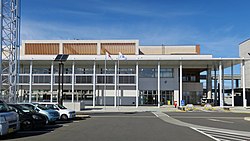Jōsō
Jōsō
常総市 | |
|---|---|
 Jōsō city hall | |
 Location of Jōsō in Ibaraki Prefecture | |
| Coordinates: 36°1′24.8″N 139°59′37.8″E / 36.023556°N 139.993833°E | |
| Country | Japan |
| Region | Kantō |
| Prefecture | Ibaraki |
| Area | |
• Total | 123.64 km2 (47.74 sq mi) |
| Population (October 2020) | |
• Total | 59,314 |
| • Density | 480/km2 (1,200/sq mi) |
| Time zone | UTC+9 (Japan Standard Time) |
| - Tree | Oak |
| - Flower | Sakura |
| - Bird | Japanese bush warbler |
| Phone number | 0297-23-2111 |
| Address | 3222-3 Mitsukaido Suwa-cho, Jōsō-shi, Ibaraki-ken 303-8501 |
| Website | Official website |

Jōsō (常総市, Jōsō-shi) is a city located in Ibaraki Prefecture, Japan. As of 1 October 2020[update], the city had an estimated population of 59,314 in 21,168 households and a population density of 480 persons per km². The percentage of the population aged over 65 was 38.8%.[1] The total area of the city is 123.64 square kilometres (47.74 sq mi). The city has a large expatriate population from Brazil.
Geography
Jōsō is located in southwestern Ibaraki Prefecture, approximately 50 kilometers north of central Tokyo and 70 kilometers from the prefectural capital at Mito. Most of the city is flat, with an average elevation of 10 to 20 meters above sea level. The Kinugawa River flows through the city.
Surrounding municipalities
Ibaraki Prefecture
Chiba Prefecture
Climate
Jōsō has a Humid continental climate (Köppen Cfa) characterized by warm summers and cool winters with light snowfall. The average annual temperature in Jōsō is 14.2 °C. The average annual rainfall is 1302 mm with September as the wettest month. The temperatures are highest on average in August, at around 26.2 °C, and lowest in January, at around 3.1 °C.[2]
Demographics
Per Japanese census data,[3] the population of Jōsō has remained relatively stable over the past 50 years.
| Year | Pop. | ±% |
|---|---|---|
| 1950 | 62,874 | — |
| 1960 | 56,881 | −9.5% |
| 1970 | 55,152 | −3.0% |
| 1980 | 60,809 | +10.3% |
| 1990 | 64,344 | +5.8% |
| 2000 | 66,245 | +3.0% |
| 2010 | 65,332 | −1.4% |
History
During the Edo period, the area was part of Shimōsa Province, and Mitsukaido village developed as a center for river transportation on the Kinugawa River. The town of Mitsukaidō was established within Toyoda District with the creation of the modern municipalities system on April 1, 1889. The area was transferred to Yūki District in 1894. On July 10, 1954 Mitsukaidō merged with the villages of Sugawara, Ohanawa, Mitsuma, Goka, Ono and Sakate, and was elevated to city status. It further annexed the villages of Sugao and Uchimoriya on April 1, 1956.
On January 1, 2006, Mitsukaidō absorbed the neighboring town of Ishige, Yūki District, Ibaraki and officially changed their name to Jōsō. The area suffered much damage from flooding of the Kinugawa River due to heavy rains in September 2015.
Government
Jōsō has a mayor-council form of government with a directly elected mayor and a unicameral city council of 22 members. Jōsō, together with neighboring Yachiyo, contributes two members to the Ibaraki Prefectural Assembly. In terms of national politics, the city is part of Ibaraki 7th district of the lower house of the Diet of Japan.
Economy
Jōsō has a mixed economy, with three large industrial parks; however, 50% of the city's area is farmland.
Education
Jōsō has 14 public elementary schools and five public middle schools operated by the city government, and three public high schools operated by the Ibaraki Prefectural Board of Education.
In additional there are two Brazilian schools: Escola e Creche Grupo Opção and Escola Taiyo [4] One more Brazilian primary school (UBEK – Unidade Brasileira de Ensino Kanto) is now closed[5]
Transportation
Railway
- Mitsukaidō - Kita-Mitsukaidō - Nakatsuma - Mitsuma - Minami-Ishige - Ishige - Tamamura
Highway
Local attractions
This section needs expansion. You can help by adding to it. (November 2015) |
Notable people from Jōsō
- Michiko Hada, actress
- Yuko Matsuoka,– comedian
- Takayuki Okada, professional motorcycle racer
- Keiji Suzuki, judoka
- Takashi Ono, judoka
- Kazuhiko Hosokawa, professional golfer
- Tomi Okawa, table tennis player
- Takashi Nagatsuka, writer, poet
- Akira Kazami, politician
- Atsushi Koyano, scholar of contemporary literature
References
- ^ "Ibaraki prefectural official statistics" (in Japanese). Japan.
- ^ Jōsō climate data
- ^ Jōsō population statistics
- ^ "Escolas Brasileiras Homologadas no Japão" (Archive). Embassy of Brazil in Tokyo. Retrieved on October 13, 2015.
- ^ "Escolas Brasileiras Homologadas no Japão" (). Embassy of Brazil in Tokyo. February 7, 2008. Retrieved on October 13, 2015.
External links
- Official Website (in Japanese)



